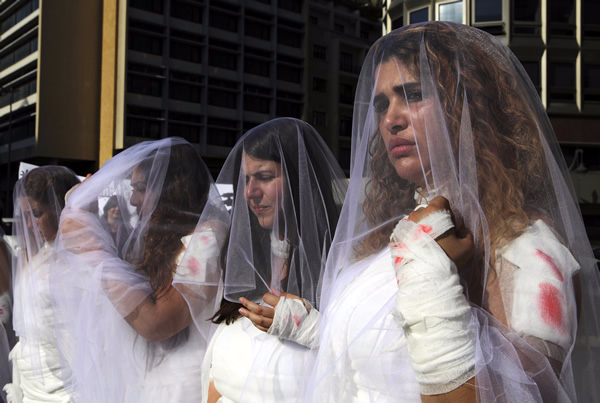
Lebanese women dressed in bloody bridal gowns protest law that allows rapists to avoid prosecution if they marry their victims. AP Photo/Bilal Hussein
Parashat Ki Tetze
Deuteronomy 21:10 – 25:19
Our Torah portion contains many commandments, including quite a few that teach radical lessons for living a life of compassion and righteousness. But there are other examples of laws that strain our ability to see them as humane!
One such objectionable law is the command that a rapist must marry his victim. Furthermore, after paying a fine to the father of the woman he has attacked, his marriage is to be permanent – “he shall not be able to send her away (- divorce her) all his days.” (Deut. 22:29) In defense of this law, the reasoning behind it has been explained as deriving from a concern for the victim. A woman who had been raped, according to this explanation, would be treated as an outcast by her society in Biblical times. Her family would reject her from shame and outrage. So the rapist is forced to give her a home and must do so permanently.
This explanation has some historical validity. But it should strike us a sorely lacking in moral adequacy. Aside from the fact that the crime seems to go almost completely unpunished ( – a fine?) there is no recognition that the victim has any will of her own. The rape perpetrated by the criminal is reinforced by not giving the victim any say in choosing her own future. She is condemned to continued rape. Nor is her family challenged to help her and protect her. The law is based on accepting that society was once rife with prejudicial attitudes that blamed the female victim.
But slowly this is changing. Versions of this law have persisted to this very day. But the law’s injustice, to the point of obscenity, is being recognized ever more widely. Just this spring and summer there have been numerous reports of legal breakthroughs in various countries where women have finally succeeded in overturning laws that allowed rapists to escape punishment by marrying their victims. (See reports by Rebecca Ratcliffe and by Semini Sengupta)
And, lest we think that this problem has been relegated only to “primitive” societies and that we, in the USA, are liberated from its legacy, we should attend to the recent report offered by Nicholas Kristof.
Thanks to the increasing empowerment of women in our generation, we are finally waking up to the harm such an approach causes to the victims of rape, perpetuating their suffering to the point of bringing about their deaths, by suicide or murder. And we are starting to refuse to accept that our society can adopt such a limited view of the inherent dignity of all humans, female as well as male, or of their powers to control their impulses.
Progress is happening gradually and sporadically. The need for change, in our attitudes and in our laws, is urgent but the pace is slow.
Where do the Torah’s laws fit into this process? Is the Torah’s sacred position in our Jewish culture and in society at large a factor that promotes the progress we need to make or does it impede that progress? Or, is the Torah’s law stuck in a time long past? Is it, by now, irrelevant? One must choose.
To choose the first set of possibilities is to assume that the Torah has some kind of authority, some continued voice, in forming our lives. But then one must choose between a conservative and a progressive view of the Torah’s purpose. So there are some who choose to believe in the power of the Torah such that they cannot see any other way of reading it but in a frozen way that refuses to allow for change. Modern concepts of human rights and human dignity are dismissed as unholy fads that must be dismissed in the name of God.
But if one chooses to believe that the Torah is sacred and relevant because it is on the side of promoting greater justice for all, then one is compelled to constantly work toward a way of reading the Torah that will lead us to that end. The challenge is to place the Torah in a historical context, a context that recognizes the changes of human history, and yet serves to sanctify it rather than to dismiss it as an ancient relic.
Just as the Torah ends by pointing the Israelites toward entering the Promised Land, though they are not yet there, so does the Torah’s legal system prepare us to continue our journey of mitzvot as a holy nation. The Written Torah would then be a precious document that crystalizes a poignant moment in the Divine – human encounter. God realized that God could only ask so much of us at that moment. It was just enough to make it possible for us to accept a challenge that, were it pushed just a little further at that time, would have been impossible to embrace. But it is not the final goal that we are capable of achieving. One must work for a way of hearing the Torah’s voice as a voice that invests so much loving hope in us, calling on us to keep carrying her values forward.
Shabbat Shalom,
Rabbi David Greenstein
![]()
Subscribe to Rabbi Greenstein’s weekly d’var Torah
- Toby Stein: In Memoriam - Thu, Feb 8, 2024
- Faithfulness and Hope: Parashat Sh’lach - Thu, Jun 23, 2022
- Past Their Prime: Parashat B’ha`a lot’kha - Thu, Jun 16, 2022
